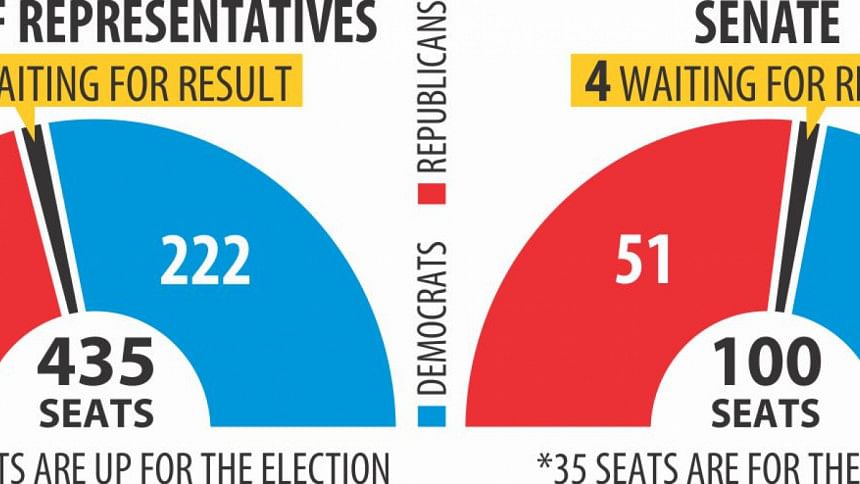US midterm elections: Voters deliver mixed verdict

-- Democrats will control House for first time in eight years
-- Republicans consolidate their hold on Senate
-- Divided congressional control portends political gridlock
A defiant President Donald Trump yesterday shrugged off the loss of the House of Representatives as Washington braced for the prospects of partisan warfare after US voters delivered a mixed verdict in a hard-fought midterm election.
Also read: 10 things to know about US midterm election results
With Democrats promising aggressive probes of Trump's administration and his personal finances after winning the House, the president went on the offensive.
"If the Democrats think they are going to waste Taxpayer Money investigating us at the House level, then we will likewise be forced to consider investigating them for all of the leaks of Classified information, and much else, at the Senate level," Trump said on Twitter.
"Two can play that game!"
Trump also lashed out at the ongoing investigation by Special Counsel Robert Mueller into whether his 2016 election campaign colluded with Russia to help him win the White House, branding it a "disgusting Witch Hunt."
Democrats won the House on Tuesday but Republicans increased their majority in the Senate in an election which revealed a country still sharply divided along party lines.
According to projections by The New York Times, Democrats will have 229 seats in the 435-member House while Republicans will hold 53 seats in the 100-member Senate, up from 51. So far, based on published results, Democrats have 222 seats in House and 45 seats in Senate. And Republicans have 199 seats in House and 51 seats in senate.
Despite the setback, Trump, in a news conference at the White House, yesterday hailed the election day as a "big day" for Republicans.
He offered an olive branch to Democrats, praising their leader and likely next House speaker Nancy Pelosi, but angrily lashed out at journalists for questioning his congressional campaign tactics.
Trump campaigned aggressively in the closing days on a hardline anti-immigration message.

Trump reeled off a shopping list of disadvantages the Republicans had faced going into Tuesday's vote, including "wealthy donors and special interests," for the Democrats, and "very hostile media coverage, to put it mildly."
The Republican president said he would "like to see bipartisanship" and offered Pelosi "a lot of credit for what she has done and accomplished." He cited health care and infrastructure as areas where the two parties could work together.
Republicans defeated Democratic senators in several states won by Trump in 2016 -- Florida, Indiana, Missouri and North Dakota.
Republican senate candidates were also leading in Arizona and Montana. Democrats appear to have won a Republican senate seat in Nevada.
Democrats also picked up seven governorships but fell short in a high-profile race for the governor's mansion in Florida, expected to play a key role in the 2020 presidential election.
With the House victory, Democrats will take over commitees, giving them the power to hold hearings, call witnesses and issue subpoenas to administration officials.
"We will conduct the investigations that Republicans wouldn't conduct," Democratic Representative Eric Swalwell of California said on NBC's "Today" show.
"We'll fill in the gaps on the Russia investigations," he said of the Mueller probe. "American people will see (Trump's) tax returns."
"There will be intensified fighting," said Larry Sabato, director of the Center for Politics at the University of Virginia.
"There is now a veto in the system to limit Trump and the Senate -- though Trump will use executive orders to bypass Congress," Sabato said.
Senate majority leader Mitch McConnell said he expected the president would be able to work with a divided Congress.
Nancy Pelosi, who is likely to return as speaker of the House despite opposition from some centrist Democrats, promised that the party will serve as a counterweight -- but also work with Trump.
"Today is more than about Democrats and Republicans. It's about restoring the constitution's checks and balances to the Trump administration," Pelosi said.
But she added: "A Democratic Congress will work for solutions that bring us together, because we have all had enough of division."
Like in the 2016 presidential election, rural areas went heavily for Republicans while urban areas broke towards the Democrats.
More women than men voted for Democrats, according to exit polls, particularly white suburban women, and the new House will feature a record number of women lawmakers.
Tuesday's contest saw several historic firsts in the Democratic camp: in Kansas, Sharice Davids and Deb Haaland became the first Native American women elected to Congress.
And in the Midwest, onetime Somali refugee Ilhan Omar and Rashida Tlaib, the daughter of Palestinian immigrants, shared the historic distinction of becoming the first two Muslim women elected to Congress.
But the rosiest expectations of some Democrats -- that they could create a "blue wave" even when playing defense on the Senate map -- proved unfounded.
Meanwhile, former US president Barack Obama spoke of his pride over Democratic gains made in the midterms-- but warned the battle for much-needed reforms had only just begun.
"Our work goes on. The change we need won't come from one election alone -- but it is a start. Last night, voters across the country started it," Obama said in a statement.
"I'm hopeful that going forward, we'll begin a return to the values we expect in our public life -- honesty, decency, compromise, and standing up for one another as Americans, not separated by our differences, but bound together by one common creed."
In one of the most closely-watched races, Democratic Senate candidate Beto O'Rourke, a charismatic congressman and former punk rocker, fell short against Republican Senator Ted Cruz in Texas.

 For all latest news, follow The Daily Star's Google News channel.
For all latest news, follow The Daily Star's Google News channel. 








Comments